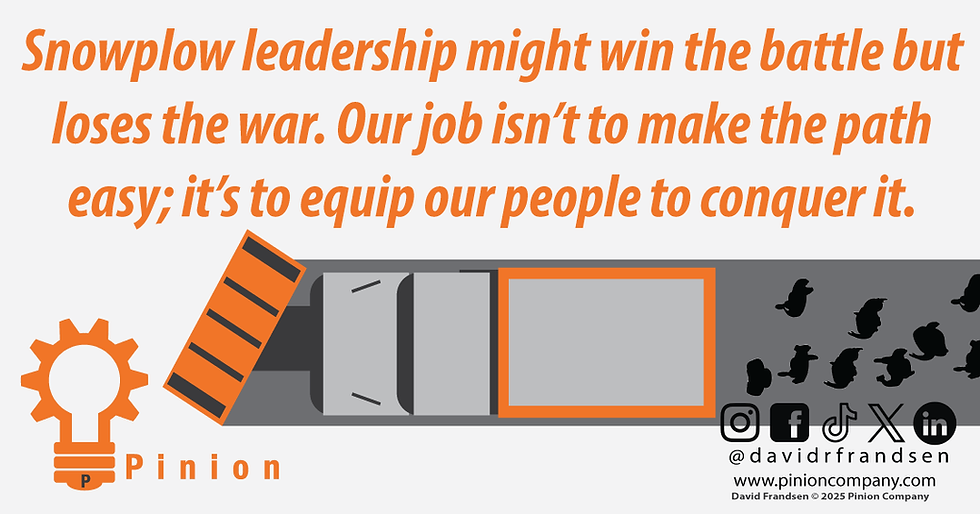The "Old Yeller" Approach: Leadership Lessons in Compassionate Accountability
- David Frandsen
- Mar 2, 2025
- 4 min read

In the story of Old Yeller, Travis Coates, a young boy, is forced to make a heartbreaking decision when his beloved dog, Old Yeller, is bitten by a rabid wolf. Knowing that rabies will inevitably take hold, Travis understands that he must put Old Yeller down. It’s not just about the danger to his family—it’s also about sparing Old Yeller from unnecessary suffering. Despite the immense pain it causes him, Travis takes responsibility because Old Yeller is his dog. This moment encapsulates the essence of leadership: taking ownership of hard decisions, even when they hurt.
The Leadership Parallel: Owning Difficult Decisions
As leaders, we often find ourselves in situations where we must make tough calls that impact people we care about. The "Old Yeller" approach is a reminder that leadership is not just about authority or delegation—it's about responsibility. When something difficult needs to be done, especially when it involves someone on your team, it is not a job to pass off to someone else. It’s your responsibility to step up and handle it with integrity and compassion.
In the story, Travis doesn’t shy away from his duty. He does not ask his mother or anyone else to do it for him. He recognizes that as much as he loves Old Yeller, sparing him from suffering is the kindest thing he can do. Similarly, as leaders, we must confront situations where emotions and relationships are at play—whether it’s letting someone go, addressing poor performance, or making decisions that affect livelihoods. These moments test our resolve because they’re not just professional; they’re deeply personal.
The Emotional Weight of Leadership
What makes this approach so difficult is the emotional burden it places on us as leaders. Like Travis, we form bonds with those we lead. We see their potential, their struggles, and their humanity. This connection can make tough decisions feel almost unbearable. However, avoiding these decisions often leads to greater harm—for the individual, the team, and the organization.
In leadership, there’s a temptation to delay or delegate difficult actions out of empathy or fear of conflict. However, this only prolongs problems and creates uncertainty for everyone involved. The "Old Yeller" approach teaches us that while these decisions are painful in the moment, they are often necessary for the greater good.
The Kindness in Accountability
One of the most poignant aspects of this metaphor is its emphasis on kindness through accountability. In Old Yeller, putting the dog down wasn’t an act of cruelty; it was an act of mercy. Similarly, in leadership, doing what’s right—even when it’s hard—is often the kindest thing you can do for someone.
For example:
Keeping an employee in a role where they are struggling or failing isn’t fair to them or the team.
Avoiding necessary feedback denies people the opportunity to grow.
Allowing toxic behavior to persist harms everyone involved.
Taking action, no matter how difficult, can ultimately lead to better outcomes for all parties.
Leading with Responsibility
The "Old Yeller" approach also underscores the importance of personal responsibility in leadership. It’s easy to pass off difficult tasks or hope problems resolve themselves over time. True leaders do not shy away from hard conversations or painful decisions, they own them.
In my own experience as a leader, I have had moments where I had to make decisions that felt like putting down Old Yeller. One instance involved an employee I genuinely liked but who was clearly struggling in their role. After consulting with others and recognizing what needed to be done for both the individual and the organization, I knew I had to take responsibility and handle it myself. It was one of the hardest things I’ve ever done—but also one of the most necessary.
Balancing Empathy with Action
The "Old Yeller" approach does not mean abandoning empathy, it means balancing it with action. As leaders, we must care deeply about our people while also having the courage to make decisions that serve their best interests and those of the organization.
This balance is what makes leadership so challenging yet so rewarding:
Empathy without action leads to stagnation.
Action without empathy leads to disconnection.
Empathy combined with decisive action leads to trust and respect.
Conclusion
The "Old Yeller" moment in leadership is never easy, it’s heart-wrenching and emotionally taxing. It is also one of the most defining aspects of what it means to lead with integrity and accountability. Like Travis in Old Yeller, we must recognize that sometimes doing what’s right hurts deeply but is ultimately necessary for everyone involved.
I'm not too proud to admit that I cried when Old Yeller died as a kid, and the weight of having to make a similarly difficult, albeit professional, decision brought those feelings flooding back. I've even shed tears after letting an employee go; despite knowing it was the correct course of action for both the individual and the organization.
Leadership isn’t about avoiding hard decisions; it’s about owning them. It’s about stepping into discomfort because you care enough about your team, your organization, and your values to do what needs to be done—even when it feels like you’re breaking your own heart in the process. That’s what true leadership looks like: responsibility wrapped in compassion and courage.
#GearUpForSuccess, #GearUp, #GearUpYourOrganization, #LeadershipDevelopment, #Leadership, #LeadershipSkills, #LeadershipTraining, #ProfessionalDevelopment, #LeadershipCoaching, #PersonalGrowth, #CareerDevelopment, #LeadershipQuotes, #LeadershipGoals, #Coaching, #Entrepreneurship, #Mindset, #Success, #PersonalDevelopment, #BusinessStrategy, #ProfessionalGrowth, #LeadershipMatters, #LeadershipLessons, #Empowerment




Comments